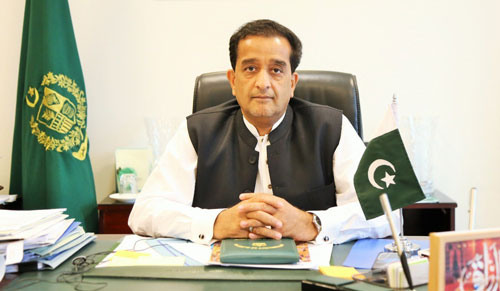Zubair Qureshi
The Ministry of Climate Change in collaboration with the United Nations Development Programme (UNDP) launched a comprehensive report on “Youth and Climate Change Perception” in Islamabad on Sunday.
Malik Amin Aslam, Special Assistant to the Prime Minister on Climate Change was the chief guest on the occasion.
Senior management of the Ministry of Climate Change (MoCC) and the UNDP including Naheed Shah Durrani, Secretary, MoCC and Ms Aliona Niculita, UNDP Resident Representative attended the event.
The study explores the youth of Pakistan’s varied perspectives on climate change, against themes of vulnerability, adaptation strategies, regulatory knowledge, and climate advocacy; and provided crucial insights into the background, knowledge and awareness of youth about the concept, causes and effects of climate change.
The survey has also been included in Pakistan Economic Survey 2020-2021. Speaking on the occasion, Malik Amin Aslam, Special Assistant to the Prime Minister on Climate Change stated, ‘Pakistan’s youth carries incredible potential to ensure sustainable development.
A resilient youth translates to a resilient nation, and our youth has taken initiatives that carry not only socioeconomic significance but have an eco-friendliness facet to it as well.
The incumbent government is very cognizant of this youth potential and has made it its top priority to engage youth in its developmental interventions.’
UNDP Resident Representative a.i. Ms. Aliona Niculita said, ‘Well aligned with the Government of Pakistan’s priorities, UNDP has been working to enhance representation of youth in the national climate agenda.
I am glad that UNDP, under its Climate Promise initiative, has supported the Government of Pakistan in undertaking this rapid perception study, which opens more avenues for collaborative policy and programmatic efforts. We are dedicated to mainstream the voice of marginalized youth in national climate plans.’
During the event, Naheed Shah Durrani, Secretary MoCC, said, ‘Pakistan is going through a tough period, where we have to ensure that social, economic and environmental performance of Pakistan grows at a steady rate.
Against the challenges of climate change and growing rates of unemployment, we have launched a range of youth-focused policies and programmes to involve them in national development.
We need to harness Pakistani youth’s potential to build a better, sustainable future.’ A panel discussion was also held at the launch event where young climate activists and professionals working in climate change sphere shared their insights on youth’s role in climate action and policymaking.
The panellists discussed how youth can be engaged at the grassroots level to improve climate change adaptation techniques as well as ways to promote women-led climate action.
They also deliberated on the youth’s role in promoting circular economy practices and ensuring sustainable consumption and production.
With 68 percent of the population below the age of 30, and 27 percent between the ages of 15 and 29, young people form the biggest segment of the society and can play a significant role as agents of change in development of the country and tackling climate change.
Through its dedicated Environment and Climate Change Unit and the Youth Empowerment Programme, UNDP in Pakistan has been implementing various projects nationwide in harnessing youth’s potential to combat the impacts of climate change.
Leveraging on the strong partnership with the Ministry of Climate Change and key stakeholders, UNDP will continue its effort to mainstream youth in the planning process and be an integral part of climate action.










